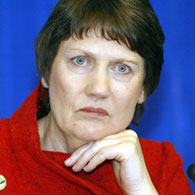The Government's announcement that it has chosen a nearly $15b option to build a single light rail metro line from Wynyard through the Isthmus to Mt Roskill then Mangere and the Airport utterly astonishes me, Although I obtain some schadenfreude from the urbanists upset that it isn't a street tram (in part because they WANT it to take away road space from other traffic), I remain utterly gobsmacked that the amount of money concerned and the hype surrounding what it is mean to do doesn't appear to have much concern at all from The Treasury.
On purely opportunity cost alone the idea that it is worth spending that amount on money on ONE fast tram line ought to be shades of the Think Big debacles of the 1970s and 1980s. Sure it is easy to question whether some of the motorway projects the National Government advanced were the best use of road users taxes, but this is in another league. If you were to put all of Kiwirail on the market, and even guarantee ongoing operating subsidies for commuter rail in Auckland and Wellington, I doubt you would get one-tenth of the capital costs of that single line - that ought to put in perspective what this is about.
What gets me the most is that the very basic pure public policy questions surrounding this project haven't been asked, it looks just like a politically driven legacy project, fueled by Phil Goff on the one hand, with Michael Wood and Grant Robertson willing to jump on the boondoggle.
Of course it has an "indicative business case", which like all massive government projects aren't business cases at all, because there is no business here. Auckland Light Rail will never generate a financial surplus of revenue over operating cost, let alone a return on capital. Of course, large government transport projects rarely do, but the language used is instructive, because some companies will make a fortune from Auckland Light Rail, in construction and technical consultancy. A common assumption that NZTA historically used for major projects was that 15% of construction costs were consultancy and technical advisory services, and there are multiple companies circling around that trough, after all it's over $2b in fees. NO consultancy has a commercial interest in being critical of this opportunity to obtain serious bonuses for their New Zealand operations.
Anyway, what about this business case (PDF).
It says:
The following sets out the problems that the proposed investment in rapid transit will address:
• A high reliance on cars is adversely affecting the climate as well as increasing harm from injury and pollution
• Increasing congestion will further disrupt and lengthen travel times, threatening investment and quality of life
• Some communities have worse access to public transport connections, creating inequity and reducing social cohesion
This is frankly pathetic. So the problems are "too much car use", "congestion" and "poor public transport connections".
Even if you leave to one side the absurdity that high reliance of cars in Auckland is adversely affecting the climate (like a child urinating in Lake Taupo is poisoning it), climate change policy is addressed through the Emissions Trading Scheme, which caps emissions from transport. The efficient tool to address this is to lower the cap, increasing the price of fuel, so people drive less. If this is about climate change it's a monstrously wasteful way of doing it, and it wont have any meaningful impact.
The claim of "increasing harm from injury and pollution" is questionable. MoT resources state:
and there is no evidence of increasing pollution, largely because engines are getting cleaner and there is a growing number of low and zero emission vehicles. However, it doesn't really matter. If you think a primary reason to build a light rail metro is to address injuries and pollution on the roads then you're a moron. You can reduce injuries by better enforcing drink driving laws, speed limits, traffic light violations dangerous driving, not build a light metro line.
Then there is congestion. The reason there is traffic congestion is that demand for roadspace exceeds supply and politicians choose to price that roadspace the same, everywhere in NZ at all times. Price it higher at peak times and locations and congestion will ease. Price the roads properly and there is more space for buses, and buses can run more frequently and reliably, but that's not exciting for politicians.
Building a light rail metro wont ease congestion, although it WILL provide a fast link, given that passengers are forecast to not be willing to pay more than a small fraction of the cost of building and running it, suggests they don't value time THAT much, and more importantly, that congestion isn't bad enough for them to pay a lot more to avoid it.
"Threatening investment" by whom? If you think Auckland Light Rail will relieve congestion across Auckland you're a moron, in fact you're a moron if you think it will relieve congestion on the corridor it will serve too.
Finally there is the badly worded "Some communities have worse access to public transport connections" worse than what? This is no doubt true in some form, but do you really think $15b is best spent on a single light rail metro line when you could almost certainly spend a tenth of that on frequent cross-city buses and bus priority measures to seriously uplift the city's public transport network?
After all this connection will be nice for people in Mt Albert and Mt Roskill wanting a quick trip into the CBD (remember only 13% of Auckland jobs are in the CBD), noting that Mt Albert already has a railway station connecting to the City Rail Link underground electric railway under construction. Who wants to go from Mt Albert and Mt Roskill to Onehunga and Mangere? I doubt many do. From Onehunga, the light rail metro will probably be slower than the existing train service, and from Mangere it is quite the indirect route to the CBD, but it is good to get to the airport. Remember that, this will be a slow route from the airport into the city centre, but be marginally useful from Mt Roskill.
Then take this utter drivel from the "business case":
Using public transport to travel from Māngere to the city centre takes more than twice as long than using a private vehicle. As a result, private vehicles account for 85 percent of all journeys to work by Māngere residents
According to the census (using this remarkable visualisation), the number one destination for people from Mangere Central to work or school is Auckland Airport
It's a logical non-sequitur to claim that because it takes twice as long to go by public transport to the city centre than by car that this means that most journeys to work by Mangere residents are by car, because in fact only 5% of them actually work in the city centre.
So when it estimates that nearly 32m rides will be taken on this line by 2051 you have to take it with a pinch of salt. In 2019 there were 103m rides across ALL railway, bus and ferry routes in Auckland, so to expect ONE line to carry about a third of that is ludicrous. For that travel it is going to cost $109m a year to operate, so it needs to charge $3.40 per fare to break even on operating costs, but that's not going to happen is it? It is meant to have the capacity of 32,600 people per hou, this is not far short of London's Victoria Line (at 37, 226), does anyone seriously think that EVEN with intensification there is going to be that level of demand on this line?
So given THOSE problems to solve, Auckland Light Rail is an abject failure, it doesn't address any of these effectively.
So I'll make some not-so-bold assertions, that I would happily have refuted:
- Auckland Light Rail will make next to no impact on traffic congestion (and the business case ADMITS this on pg. 59.
- There isn't going to be continuously growing demand for travel on this corridor to and from the CBD. In fact, Covid19 and changing work trends mean that the norm will be that people wont be in offices five days a week, which completely undermines the case for large scale peak transport capacity in cities
- For 1% of the cost of this project, there could be some significant improvements in bus reliability and travel times along corridors, with bus rapid transit, bus priority measures at intersections and use of road pricing
- For 3% of the cost of this project, Auckland could have an interconnected cycle lane network across the whole city
- For another 6% of the cost of this project Auckland could have a comprehensive network of bus lanes and bus priority measures, higher frequency services AND payment using contactless debit and credit cards which would address all of the social issues, and encourage people to drive less.
- Auckland Light Rail not only wont and cant stop urban sprawl, but also is unnecessary to support housing intensification, primarily because most jobs are still not going to be anywhere along the proposed corridor. Furthermore, housing intensification along the corridor will have a marginal impact on housing pricing
and no, there is even LESS point building the slow tram along the street that the Greens want, because they mainly want it to take away road capacity. Tradespeople, freight and delivery are unimportant to them, it's just the war on driving, so that rightfully has been dismissed.
Auckland Light Rail is an incredibly expensive folly, it isn't transformative (but the money it costs COULD be transformative in more subtle, more geographically spread and more effective ways that aren't so exciting to politicians) and it is almost certain there wont be anywhere near enough demand to justify it.
Fares wont pay a cent towards its capital costs, and even property taxes that could be levied to pay for it, wont pay for more than a small fraction of the project. Ratepayers aren't willing to pay for it, and there isn't enough money raised from motoring taxes to pay much towards it either. It needs to be scrapped, and Auckland transport planners (and both Auckland and national politicians) need to focus on how to make existing networks work better, rather than the exciting fetish of a big shiny high capacity boondoggle....
UPDATE: Of course taxpayer-funded radio (RNZ) discusses light rail with a critical view from.... the Green/left perspective. The argument Matt Lowrie from the urbanist blog Greater Auckland is partly opportunity cost (it's cheaper to build a slow tram than a fast metro, so there is money to spend on... more slow trams), but then he's quoted as saying it is needed for Wellington, Christchurch, Hamilton and Tauranga? It's economic insanity, but why should anyone be surprised that state radio regards a different perspective to only be from its own tribe of Green Party supporters.





